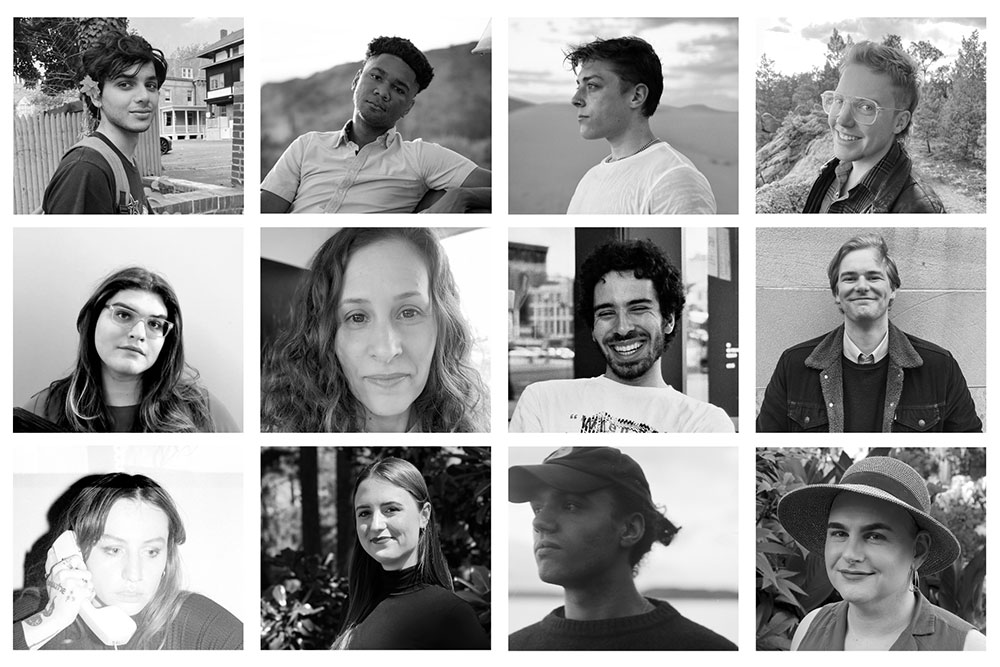The writer Franz Kafka famously said, “A book must be the axe for the frozen sea within us.” William Ward Butler and Jackson D. Moorman remember those words as they read hundreds of submissions for their poetry journal. They are searching for the axes.
The journal, aptly named Frozen Sea, is published online quarterly, with occasional special issues. Launched in October 2023, the publication prepares to release Issue Five on Aug. 15. Like the four issues that precede it, the latest offering features the work of a diverse group of early-career poets and visual artists.
Butler, who is serving his first year of a three-year term as the Poet Laureate of Los Gatos, has kept an eye on the landscape of poetry journals since his time as a creative writing major at UCSC.
“The process of submitting to literary journals is kind of uniquely awful,” he says, noting the months of waiting for a response and the fees writers typically contend with. Frozen Sea bucks that trend by responding to submitters within a month. The journal does not charge a reading fee, and there are no paywalls involved. They also circumvent Submittable—a software many journals require—in favor of more direct email correspondence.
“Sometimes when I submit to journals, it feels like the answer is no and it’s no forever,” Butler says. At this phase, Butler and Moorman are enjoying bringing more humanity to the process, especially when it comes to the sensitive task of declining work. “We try to be friendly and approachable and communicative. We also try to be authentic about what we’re communicating,” Butler says.
Frozen Sea takes this value of accessibility even further with its emphasis on mobile-friendly design, which is Moorman’s specialty. “I was talking with Jackson,” Butler says, “and we just acknowledged that when we’re reading a journal or a poem that’s being shared, we are on our phone, we’re often on Instagram or other social media.” Where many journals still seem to resist the reality of our digital existence, Frozen Sea embraces it, formatting work to the margins of a phone. Poems from each issue appear on the journal’s Instagram page in addition to its website, along with audio of the writer reading the piece.
A glance at any Frozen Sea webpage makes clear that the journal is not just easy to share but also a pleasure to share. Muted colors, oceanic details and minimalist graphics strike a balance between professionalism and personality. “I’m really drawn to journals that have some fun experimentation in terms of what they’re doing with the site,” Butler says.
When it comes to the content Frozen Sea seeks, Butler and Moorman foreground their preference for queer writers as well as their desire to resist all forms of oppression in their lives and publishing. The journal also aims to promote writers who have not yet published full-length books.

They are also fond of concision. Butler points to poet/dancer Stefanie Leigh’s Issue Five poem, “Theme and Variations” (reprinted below), as exemplary.
“I think increasingly it feels like Frozen Sea is a little corner of the Internet where we can celebrate and champion the work of contributors who are doing really cool stuff,” he says, “and we can display it in a way that gets people excited about it.” In this spirit, the creators are currently seeking poems and art inspired by work in previous issues of Frozen Sea for a special ekphrastic issue.
The growing group of contributors and readers—what Butler calls the Frozen Sea family—sings the journal’s praises. Kristin Lueke, a poet featured in Issue Three, says, “That this magazine exists, just like this, at this moment in time—it moves me […] Jackson and William have built something beautiful in a wounded world and I am grateful to be a small part of it.”
One final way the creators are buoying their community is by promising to maintain the site in perpetuity. Though that might seem like a given, in the often-frantic world of online journals, it is not rare for one’s poem to disappear, links to become inactive, etc. The experience is disheartening for writers and artists who have entrusted their work to the faltering publication.
“The literary world is quite small,” Butler says. “I think it behooves all of us to be kind and to be thinking about what our place is within that ecosystem.”
Find out more at Frozensea.org.
Theme and Variations
by Stefanie Leigh
Costume fittings every spring in the opera house
basement. Our naked torsos,
our confidence and breaths held—
hoping the hooks and eyes in the backs
of our tutus will meet
the demands to make our protruding bones
look elegant
Stefanie Leigh is a poet and ballet dancer based in Toronto. She was a dancer with American Ballet Theatre and is currently working on her first poetry collection, Swan Arms. Her work has been published or is forthcoming in Rust & Moth, SWWIM and elsewhere.














